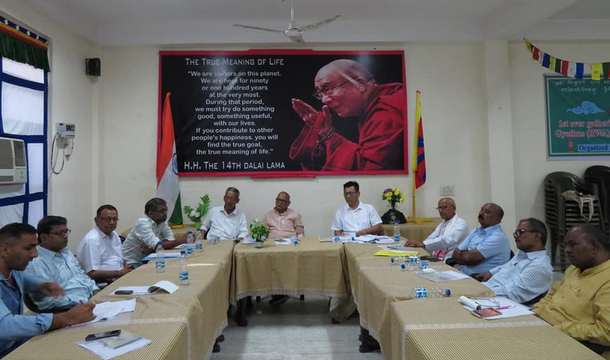Dharamshala, India — The Core group for Tibetan cause, who organized The 6th All India Tibet Support Groups Conference met with His Holiness the Dalai Lama. CTA President Dr. Lobsang Sangay, who was also present at the meeting, introduced them to His Holiness.
Shri Rinchen Khando Khrimey and Shri Surender Kumar, National Convener and National Co-Convener of the Core Group for Tibetan cause respectively were introduced to His Holiness the Dalai Lama by CTA President Dr. Lobsang Sangay at his residence on Wednesday.
The meeting was held in the background of the recently concluded the 6th All India Tibet Support Groups Conference which discussed how India and Indian people can continue to support the Tibetan cause.
His Holiness the Dalai Lama imparted words of wisdom and facts to the dignitaries.
“I always feel and emphasis politically whether Tibet part of China or not. Culturally and Linguistically Tibet is one unique culture and language. So on that level relation between India and Tibet is like the relation between Guru and Chella. Over 2000 years ago many Tibetan scholars came to India and learned Sanskrit. Then in the 8th Century, the Tibetan emperor Trisong Detsen invited Shankar Rashida a master scholar and logician at Nalanda. The emperor’s mother was Chinese.
But Tibet’s heart has always been with India. In the 7th century, Emperor Songtse Gampo married a Chinese princess, so there has a close connection between Tibetans and Chinese back then. but he found the Chinese letters very complicated. So he invented the Tibetan script, copy from Indian script. So Tibetan uniqueness of language and culture started with this invention.
In the 8th Century, during the time of the new emperor, Buddhism had already started flourishing in China. Many of these Chinese Buddhist monks came to Lhasa and one of the most sacred Buddhist statues came from China. The Tibetan emperor however preferred Buddhism should come to Tibet from Nalanda directly. So he invited Shankar Rashida. We use his writings of the Buddha Dharma of the Nalanda tradition. So we studied a lot about logic and kept the Nalanda Tradition. But after the fire at Nalanda, nothing remained.
Therefore, now Chella’s mind is smarter than Guru. We truly preserved the ancient Nalanda knowledge. We, as monks, spend 20-30 years of our lives to study and memorize all the texts by heart. I already started learning the root texts when I was 6 years old by heart. I usually tell my Indian friends that my physical body is not Indian but my mind is more Indian than those Indian educated by the British education system. So in any way, as long as Tibetan cultural heritage remains in Tibet with our own unique language. So six million Tibetan heart always look here in India. I usually tell people, Tibet is the first defense line of India.
Tibet is not seeking independence, we follow the middle way approach and not seeking separation. But we must keep our unique language and culture heritage. The Tibetan spirit remains, no matter what the political stands is. Therefore Tibetan issue is also the Indian issue. I very much appreciate what your organization is doing. I usually tell people that we are reliable Chellas.
Independence is not easy. Pandit Nehru in 1956 told me America won't go to war with China for the liberation of Tibet. It's practical. I think the previous generations made some mistakes and let go of some good opportunities. But all that's in the past, nothing can be done about that.
So according to today’s reality, the best case scenario is that politically we remain within PRC and at the same time, the Chinese constitution gives us the autonomy status.
Also, I have the view that, if we emphasize on Tibet’s independence that only contain central Tibet and western Tibet. Without asking independence, we are seeking for Autonomous, then the Chinese constitution gave many places, that outsides of Tibetan Autonomous Region recognized as Tibetan areas, so there are Autonomous Region, Autonomous districts and Autonomous Prefectures.
We are asking China, all these areas which the Chinese constitution recognized as Tibetan areas should have the same rights.


![Tibet has a rich history as a sovereign nation until the 1950s when it was invaded by China. [Photo: File]](/images/stories/Pics-2024/March/Tibet-Nation-1940s.jpg#joomlaImage://local-images/stories/Pics-2024/March/Tibet-Nation-1940s.jpg?width=1489&height=878)
















